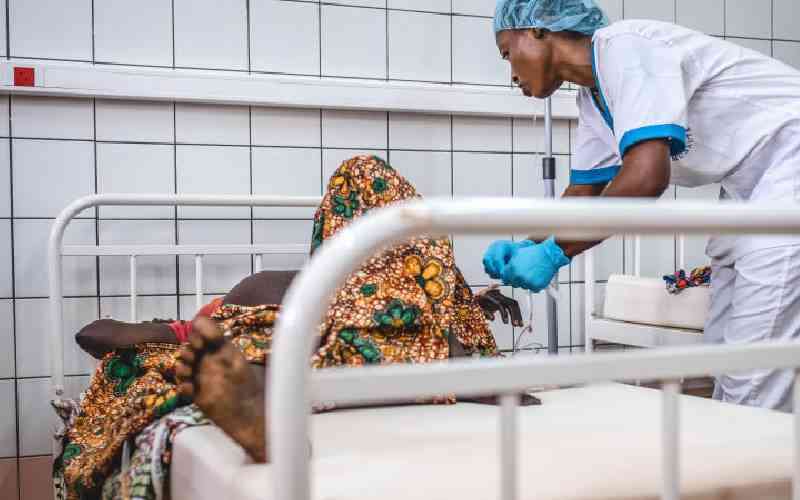
Divine has been labouring in pain for hours, her right hand clutching the bedpost, her left hand crumpling her orange and green loincloth. Her baby is overdue and she is exhausted.
In the labour ward of Bangui's community hospital, the nurse has just administered oxytocin, a hormone to speed up the frequency and intensity of her contractions.
In this unit dedicated to high-risk deliveries, women are closely monitored by medics who check their health and their baby's heart rate every 30 minutes. If a woman's labour goes on too long, she can be taken to the operating theatre to have a caesarean section.
Such attentive care is far from common for women in the Central African Republic (CAR) who are about to give birth. In a country that is severely short of health facilities and medical staff, few pregnant women have access to appropriate obstetric care.
"Many women do not go to a health centre for their delivery but give birth at home," says Adele Guerde-Seweien, a Doctors Without Borders/Medecins Sans Frontieres (MSF) midwife at Bangui's community hospital, known as the CHUC.
"In this situation, complications can easily lead to the death of mother or child."
Decades of instability and armed violence in CAR have contributed to essential medical care being out of reach for many pregnant women and newborn babies.
- How maternal health trial halved miscarriages, slashed re-admissions
- We sleep hungry: How pregnant women fight for care
- Life at 27 weeks: Challenges, triumphs of extreme preterm babies
- Fear and risk: How Kenyan women fight to survive in labour rooms
Keep Reading
Overshadowed by the security situation in the country, tackling this everyday emergency is a priority for MSF teams.
Maternal and neonatal health is a major health emergency in CAR. The country's maternal and child mortality rates are among the highest in the world.
According to the most recent statistics by World Bank on maternal mortality ratio and infant mortality; women are 138 times more likely to die of pregnancy and delivery complications in CAR than in the EU, while a baby in CAR is 25 times more likely to die before its first birthday than if it had been born in Europe.
"In CAR, to be born or to give birth is to take a risk," says Professor Norbert Richard Ngbale, an obstetrician-gynaecologist in the CHUC's maternity and neonatology department.
"There are only about 15 gynaecologists in the country, for a population of six million. There is a massive lack of qualified staff, especially in rural areas, where you mostly have traditional birth attendants who are not trained to detect complications."
Most maternal deaths in CAR are related to unsafe abortions, but also to pregnancies that occur too early (i.e. when the girl or woman is too physically immature to give birth safely) and to giving birth at home. Many of these could be avoided if healthcare was available in terms of pregnancy support or family planning provision.
CAR's chronic medical emergency is also fuelled by extreme poverty: although maternal and child healthcare is officially free in CAR, too often it is only available to those who can pay.
"In a country where 70 per cent of the population lives on less than US$2 a day, every decision must be weighed up financially, even if it means putting one's health at risk," says Rene Colgo, MSF head of mission in CAR.
"For patients, going to the hospital is an expense. They don't have money to pay for antenatal care, nor for transport to the hospital, let alone for the delivery. Many women think it is better to go to the hospital at the last minute, if at all. Supporting the provision of free care is therefore vital."
The critical situation in CAR around maternal and child healthcare has prompted MSF to provide free emergency obstetric care for women and newborns in locations across the country. MSF is also training Ministry of Health staff and renovating and equipping medical facilities so they can provide a good standard of care.
In 2021, MSF teams helped nearly 19,600 women to give birth, including 1,020 by caesarean, while 1,900 newborn babies were treated in MSF-supported neonatal units across the country.
Yet more support is needed to bring these essential services to women and babies countrywide.
"The situation calls for ambitious investment by all international partners to strengthen access to reproductive health services," says Colgo. "It is unacceptable that so many women's and babies' lives are being lost every day for reasons that are so easily preventable."
 The Standard Group Plc is a multi-media organization with investments in media
platforms spanning newspaper print
operations, television, radio broadcasting, digital and online services. The
Standard Group is recognized as a
leading multi-media house in Kenya with a key influence in matters of national
and international interest.
The Standard Group Plc is a multi-media organization with investments in media
platforms spanning newspaper print
operations, television, radio broadcasting, digital and online services. The
Standard Group is recognized as a
leading multi-media house in Kenya with a key influence in matters of national
and international interest.











